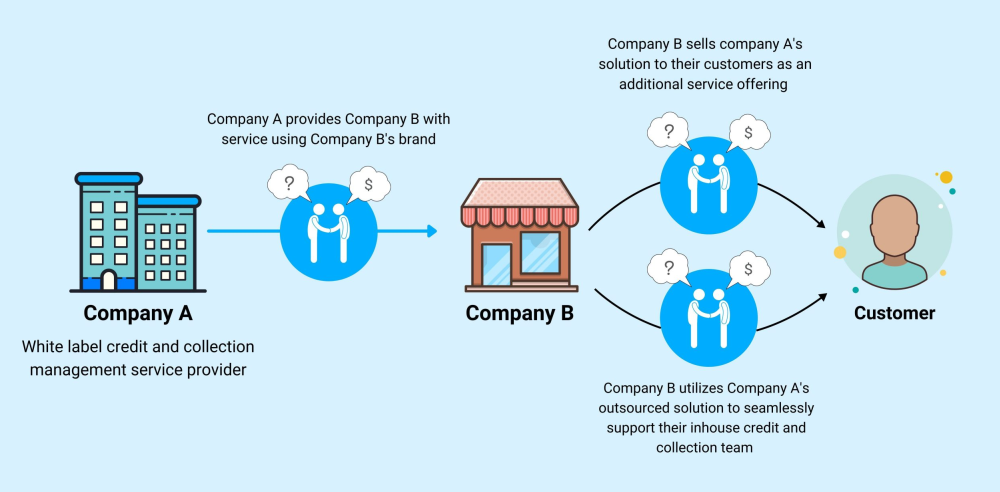How to grow and scale your startup in 2024 by leveraging the power of white label products and services

Startup founders are renowned for their ability to craft MVPs, minimum viable products that draw in early adopter customers with just enough features. The goal? Validate a product idea swiftly in the development cycle to steer clear of investing excessive time in a product no one desires.
Yet, while the emphasis remains on “building” new products, founders often overlook a potent alternative: leveraging existing products for startup growth. Enter white label services. These services enable startups to scale without the burdensome task of product development by selling trusted products under their own branding. But where does this lead us? Let’s delve deeper.
In the whirlwind of entrepreneurship, startups grapple with the challenge of expanding efficiently amid resource constraints. To navigate this complex landscape, savvy entrepreneurs are increasingly turning to white label services—a strategic approach promising accelerated growth.
Understanding White Label Services
White-label services empower startups to rebrand and resell existing products or services under their own banner. This means startups can swiftly introduce new offerings without the overhead of building from scratch. Whether it’s software solutions, digital products, or physical goods, white label services provide a shortcut to market expansion. Not to be confused with private label products, white label offerings can be sold to multiple partners and merchants, while private label products are tailored for a single retailer.
White-label services involve outsourcing specific tasks or products, which are then rebranded by the startup for resale. This approach liberates startups from the rigors of in-house development, allowing them to diversify their offerings without extensive expertise or investment.
What Are White Label Products or Services and How Do They Work?
White labeling simplifies product development for companies by allowing them to purchase goods or services from manufacturers, rebrand them as their own, and sell them to consumers. This process streamlines the expansion of a company’s product line without the need for extensive investment in research and development. Typically, companies outsource tasks or products to third-party providers, who supply the goods with minimal branding. The purchasing company then customizes the product with its own branding, packaging, and marketing materials before presenting it to consumers.
This strategy spans various industries, including software development, consumer goods, and professional services. For instance, a software company may acquire a white-label software solution from a development firm, tailor it to their specifications, and offer it to clients as part of their product portfolio. Similarly, retail brands may rebrand products from manufacturers and sell them under their own label in stores.

White Label Business Model
Overall, white labeling provides companies with a cost-effective means of diversifying their offerings, entering new markets, and strengthening their brand identity without the need for extensive investment in production or development capabilities. It’s a strategic approach that leverages existing resources to meet consumer demands efficiently.
How to Leverage White Label Products and Services to Grow and Scale Your Startup
Identifying Opportunities
The first step for startups looking to utilize white-label services is identifying areas where they can add value to their existing offerings or enter new markets. This could involve conducting market research to understand customer needs and preferences or analyzing competitors to identify gaps in the market.
Partnering with the Right Providers
Choosing the right white-label service provider is crucial for success. Startups should look for reputable providers with a track record of delivering high-quality products or services. Factors to consider include pricing, customization options, scalability, and reliability. Building strong partnerships with white-label providers can lay the foundation for long-term growth and success.
Customization and Branding
While white-label services offer pre-built solutions, startups should strive to customize these offerings to align with their brand identity and customer expectations. This could involve branding the product or service with the startup’s logo, colors, and messaging. Customization not only enhances brand recognition but also creates a unique value proposition for customers.
Providing Value-added Services
To stand out in a crowded market, startups should go beyond simply reselling white label products or services. Offering value-added services such as customer support, training, or consulting can differentiate startups from competitors and build stronger relationships with customers. These additional services can also create recurring revenue streams and foster loyalty among customers.
Scaling Responsibly
As startups grow and expand their white-label offerings, scalability becomes a key consideration. Startups should ensure that their white-label providers can accommodate growing demand and scale their services accordingly. This may involve renegotiating contracts, upgrading infrastructure, or exploring new partnership opportunities.
Advantages for Startups
- Accelerated Time-to-Market: By leveraging white label solutions, startups can expedite the introduction of new products or services, gaining a competitive edge in the market.
- Cost-Effectiveness: Opting for white label services reduces the need for hefty R&D investments and overhead costs associated with internal development, enabling startups to allocate their capital more efficiently.
- Focus on Core Competencies: Outsourcing non-core functions frees up valuable resources, allowing startup teams to concentrate on refining their core product, enhancing customer experience, or driving marketing efforts.
- Scalability and Flexibility: White label partnerships offer startups the flexibility to scale their offerings in response to market demand without being constrained by internal capacity limitations.
- Access to Expertise: Collaborating with established white label providers grants startups access to specialized skills and industry expertise, thereby enhancing the quality and innovation of their offerings.
Strategies for Leveraging White Label Services
- Identify Strategic Partnerships: Thorough research is essential to identify reputable white label providers that align with the startup’s goals and quality standards.
- Customization and Branding: Close collaboration with partners ensures that products or services are tailored to meet the unique needs and branding requirements of the startup’s target audience.
- Quality Assurance: Maintaining stringent quality control measures is paramount to safeguarding the startup’s brand reputation and ensuring that white label offerings meet the highest standards of excellence.
- Transparent Communication: Establishing open channels of communication with partners is crucial to maintaining alignment on project timelines, deliverables, and expectations.
- Continuous Evaluation and Improvement: Regular assessment of performance and feedback enables startups to iterate and optimize their white label offerings, thereby enhancing customer satisfaction and driving growth.
Real-World Success Stories
Countless startups have successfully leveraged white-label services across various sectors, including software development, digital marketing, beauty products, and e-commerce fulfillment. For instance, Jessica Smith, CEO of Bloom Beauty, emphasizes how partnering with a white-label manufacturer expedited the launch of their skincare line. Here are some compelling examples of startups harnessing white-label services to achieve remarkable growth:
Story 1: Dollar Shave Club & White Label Manufacturing
- Challenge: Dollar Shave Club aimed to provide high-quality razors at a competitive price without the manufacturing expertise.
- Solution: They partnered with white-label razor manufacturer Dorco to produce their signature blades under the Dollar Shave Club brand.
- Result: Within just four years, Dollar Shave Club grew to a billion-dollar valuation, disrupting the traditional razor market by offering affordability and convenience.
Story 2: Birchbox & White Label Beauty Products
- Challenge: Birchbox aimed to offer curated beauty boxes but lacked the resources to develop their own products.
- Solution: They collaborated with white-label cosmetics manufacturers to create customized products under the Birchbox brand.
- Result: Birchbox became a leading beauty subscription service, expanding to international markets with a diverse product range.
Story 3: Fiverr & White Label Freelancers
- Challenge: Fiverr sought to provide a diverse range of freelance services without managing individual freelancers.
- Solution: They leveraged a platform model with white-labeled freelancer profiles, offering various services under the Fiverr brand.
- Result: Fiverr became a global marketplace for freelance services, connecting businesses with skilled professionals worldwide.
Additional Examples:
- Warby Parker: Utilized white-label manufacturing for eyeglasses, focusing on their innovative brand and customer service.
- Casper: Partnered with white-label mattress manufacturers, disrupting the sleep industry with their online-first model.
- Glossier: Collaborated with white-label cosmetics labs to create their minimalist beauty products, building a loyal following through social media marketing.
Remember, while white-label services are not a magic bullet, they serve as a strategic tool for startups to accelerate growth. By choosing wisely, focusing on quality and value, and leveraging them to empower their unique offerings and customer experiences, startups can achieve remarkable success.
Conclusion
In an increasingly competitive landscape, where agility and innovation are prerequisites for success, white-label services offer startups a strategic avenue for accelerating growth and amplifying their impact. By forging strategic partnerships and embracing outsourcing, entrepreneurs can position their startups for sustainable success in the ever-evolving business landscape. This comprehensive guide underscores the transformative potential of white-label services in empowering startups to thrive and flourish in today’s dynamic entrepreneurial ecosystem.




